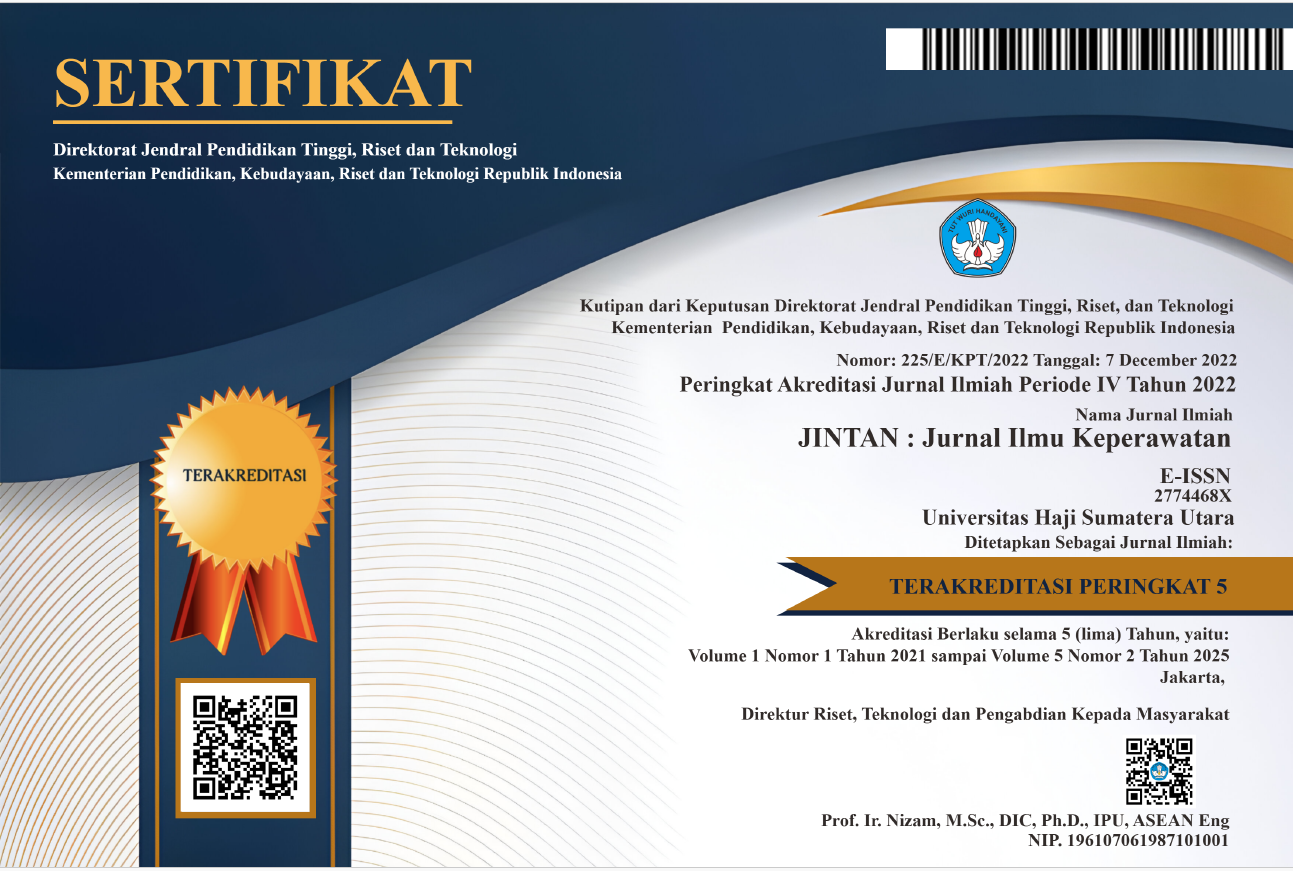Hubungan Efikasi Diri dengan Kesiapan Kerja Mahasiswa Program Studi Profesi Ners
DOI:
https://doi.org/10.51771/jintan.v2i2.339Keywords:
Efikasi Diri, Kesiapan KerjaAbstract
Introduction: Work readiness is an advanced condition or process that will be experienced by students after they feel ready and have the knowledge, attitudes, and skills needed by the world of work. Apart from work experience, work readiness is also influenced by individual internal conditions such as maturity and mental readiness and everything that requires their seriousness and focus. Work readiness requires a competency that must be prepared beforehand, this competency is influenced by the existence of self-efficacy. Self-efficacy, also known as social cognitive theory, or social learning theory, refers to an individual's belief that he or she is capable of carrying out a task. Objective: This study aims to determine the relationship between self-efficacy and work readiness of nursing professional study program students at STIKes Santa Elisabeth Medan in 2021. Methode: The research method used is correlation with a cross sectional approach, the number of respondents is 84 people. Sampling technique with total sampling technique. The results obtained were 61 people (72.6%) had high self-efficacy and 63 people (75.0%) student respondents had work readiness in the ready category. Results: The results of the Spearman Rank statistical test obtained a value of r = (.879) and p (value) = 0.000 (p <0,05). Conclusion: There is a significant relationship between self-efficacy and student work readiness. Where the correlation level is in the high category and the direction of the relationship is positive, which means the higher the self-efficacy, the higher the student’s job readiness. Suggestion: Students are expected to be able to maintain or improve self-efficacy and work readiness so that they are able to enter the world of work and carry out tasks or jobs that will be obtained in the world of work.
References
Akhmad, V. S., Yusuf, S., Safitri, A., Juwita, H., Risnah, R., & Arbianingsih, A. (2019). The Relationship between Self-Efficacy and Readiness of Interprofessional Education (IPE) among Students at the Faculty of Medical and Health Sciences UIN Alauddin Makassar. Journal of Health Science and Prevention, 3(3S), 99–106. https://doi.org/10.29080/jhsp.v3i3s.297
Amanda, M., Istiqomah, S., & Sarjiyanto, S. (2020). Pengaruh Kepribadian Proaktif, Efikasi Diri dan Anticipatory Entrepreneurial Cognitions dalam Membentuk Niat Berwirausaha Mahasiswa. Matrik : Jurnal Manajemen, Strategi Bisnis Dan Kewirausahaan, 193. https://doi.org/10.24843/matrik:jmbk.2020.v14.i02.p06
Aprilia, L. (2018). Pengaruh Efikasi Diri dan Dukungan Orang Tua Terhadap Orientasi Masa Depan. Psikoborneo: Jurnal Ilmiah Psikologi, 6(2), 228–235. https://doi.org/10.30872/psikoborneo.v6i2.4562
Eliyani, C. (2018). Peran Efikasi Diri Sebagai Variable Moderating Dari Pengaruh Pengalaman Praktik Kerja Industri Terhadap Kesiapan Kerja. Jurnal Mandiri, 2(1), 23–41. https://doi.org/10.33753/mandiri.v2i1.30
Latif, A., Yusuf, A. M., & Efendi, Z. M. (2017). Hubungan Perencanaan Karier dan Efikasi Diri dengan Kesipan Kerja Mahasiswa. Konselor, 6(1), 29. https://doi.org/10.24036/02017616535-0-00
Pangastuti, U., & Khafid, M. (2019). Peran Kematangan Karir dalam Memediasi Kompetensi Kejuruan dan Efikasi Diri terhadap Kesiapan Kerja Siswa. Economic Education Analysis Journal, 2(1), 18–23. https://doi.org/10.15294/eeaj.v8i2.31496
Tentama, F., Merdiaty, N., & Subardjo, S. (2019). Self-efficacy and work readiness among vocational high school students. Journal of Education and Learning (EduLearn), 13(2), 277–281. https://doi.org/10.11591/edulearn.v13i2.12677
Wahyu, S., Kuncoro, J., Psi, S., & Si, M. (2019). Hubungan Antara Efikasi Diri Dan Kesiapan Kerja Dengan Kecemasan Menghadapi Dunia Kerja Pada Mahasiswa Tingkat Akhir Di Universitas Islam Sultan Agung Semarang Relationship Between Self Efficacy And Work Readiness With Anxiety Of Facing The Working Work T. 517–525.
Wiharja MS, H., Rahayu, S., & Rahmiyati, E. (2020). Klasifikasi Gender Berdasarkan Suara Dengan Naive Bayes Dan Mel Frequency Cepstral Coefficient. VOCATECH: Vocational Education and Technology Journal, 2(1), 11–18. https://doi.org/10.38038/vocatech.v2i1.40
Yuwanto, D., Mayangsari, M. D., & Anward, H. H. (2016). Hubungan Efikasi Diri Dengan Kesiapan Kerja Pada Mahasiswa Yang Sedang Mempersiapkan Skripsi. Jurnal Ecopsy, 1(4). https://doi.org/10.20527/ecopsy.v1i4.506
Zulaehah, A., Rustiana, A., & Jurusan, W. S. (2018). Pengaruh Minat Kejuruan, Praktik Kerja Industri, Dan Efikasi Diri Terhadap Kesiapan Kerja. Economic Education Analysis Journal, 7(2), 526–542. http://journal.unnes.ac.id/sju/index.php/eeaj
Downloads
Published
Issue
Section
License
Copyright (c) 2022 JINTAN: Jurnal Ilmu Keperawatan

This work is licensed under a Creative Commons Attribution-ShareAlike 4.0 International License.








